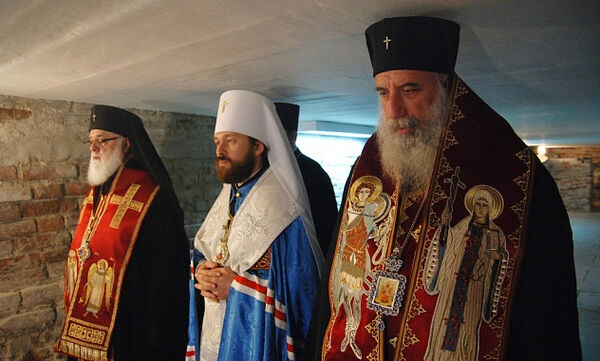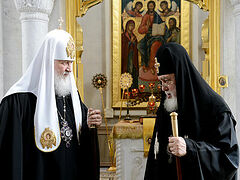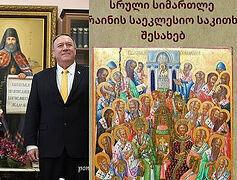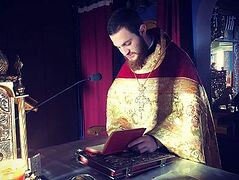Tbilisi, January 18, 2021
 Met. Gerasime of the Georgian Church's Foreign Affairs Department (right) serves a memorial litiya at the tombs of Kings Vakhtang and Teimuraz in the crypt of the Astrakhan Assumption Cathedral together with Met. Hilarion of the Russian Church's Department for External Church Relations (center) and the Georgian Church's Met. Dimitri of Batumi and Lazeti (left). Photo: mospat.ru
Met. Gerasime of the Georgian Church's Foreign Affairs Department (right) serves a memorial litiya at the tombs of Kings Vakhtang and Teimuraz in the crypt of the Astrakhan Assumption Cathedral together with Met. Hilarion of the Russian Church's Department for External Church Relations (center) and the Georgian Church's Met. Dimitri of Batumi and Lazeti (left). Photo: mospat.ru
Last week, OrthoChristian reported on tension between the Georgian and Russian Churches concerning a Russian priest serving the Divine Liturgy on the feast of the Nativity in South Ossetia, which is the ecclesiastical territory of the Georgian Orthodox Church.
In his letter to the Russian Church’s Department for External Church Relations, His Eminence Metropolitan Gerasime of Zugdidi and Tsaishi, the Chairman of the Georgian Patriarchate’s Foreign Affairs Department, called upon the Russian Church to investigate the matter and take strict measures against the priest in question, Fr. Sergei Kokoev.
In a series of posts (beginning here), Orthodox journalist and analyst Alexander Voznesensky provides some necessary background information and comments on the situation.
As he explains, Met. Gerasime gives the impression that Fr. Sergei suddenly showed up in Tskhinvali and served without a blessing, though the reality of the situation is more complicated than that. Additionally, given that Met. Gerasime publicly published his letter to the Russian Church’s DECR, Voznesensky interprets the letter as a provocation against the Russian Church.
As he explains, due to the 2008 Russo-Georgian War involving South Ossetia and Abkhazia, the Ossetians have a negative attitude towards Georgia, and thus, although it is recognized as Georgian Church territory, Georgian clergy would, in fact, not be very welcome, even if they were allowed to enter the republic.
In a 2010 interview, Hieromonk Nicodim (Bekenev), a monk of Moscow’s Sretensky Monastery with Ossetian roots, comments that even before the 2008 war, the Georgian Church had not made a serious attempt to pastor the South Ossetian people, and now, due to politics, it can’t even try.
The result is that the people are essentially left without spiritual care, Voznesensky notes. “Naturally, in view of the vacuum, those who are generally indifferent to the concept of canonical territory began to appear,” he writes.
Thus, one of the main clerics in the capital city of Tskhinvali is Fr. Jacob Khetagurov (the priest mentioned in the Sputnik reports referenced in our previous article), who was ordained by Cypriot Old Calendarists of the “True Orthodox Church of Greece.” Fr. Jacob says the people in South Ossetia are hostage to Church politics, and the locals are very fond of him—he is the father of nine and is very kind and hospitable. Thus, many go to him and aren’t particularly concerned that he is a schismatic. In September 2017, he declared the local Old Calendarist diocese to be an independent church.
Fr. Sergei Kokoev, ordained in 2013 in the Vladikavkaz and Alan Diocese of the Russian Church, is another priest serving in Tskhinvali. He built the Church of Holy Trinity where he served on Nativity. Not wanting to leave the people wholly without spiritual care, Fr. Sergei has been serving regularly in the church for three years. However, as Voznesensky notes, the Georgian Church is reacting as though it only now learned of Fr. Sergei’s ministry.
The Georgian Church insists only it can serve in South Ossetia, but it does not and cannot send any priests.
Covering the history of the scandal since Christmas, Voznesenky notes that one of the first reports about the Nativity Liturgy appeared on the site of the so-called “Association of Religious Experts” on January 12. The Association calls on the Georgian Church “to respond immediately to the incident and send a public, protest note to the Russian Patriarch. We appeal to the leaders of the Orthodox Churches to assess the anti-canonical actions of the Russian Church towards the Georgian Apostolic Church.”
As the journalist-analyst notes, the membership of this Association is completely unknown, but “It is quite possible they are American puppets.” It was Voznesensky who earlier reported on the close ties between the Russian schismatics serving in Cyprus and the American government.
The Ossetian story was picked up the same day by the Orthodox Times, the Phanariot website that is funded by the U.S. government according to publicly-available government data, “which already raises suspicion of some connection in this situation.”
Met. Gerasime of the Georgian Church wrote his letter to the Russian DECR the next day, calling for strict measures to be taken against Fr. Sergei. However, the letter was not just sent to the DECR, but was also publicly posted, “to give the issue an element of publicity and create the appropriate sentiments,” Voznesensky comments. The statement was then published on Orthodox Times and other media outlets that are openly hostile to the Russian Orthodox Church.
This begs the question—why was the letter published publicly? What is the point of this “blatant provocation” against the Russian Church, Vozensenky asks.
On the same day as its initial report, Orthodox Times also reported that “Metropolitan” Epiphany Dumenko, the head of the schismatic “Orthodox Church of Ukraine,” declared that several more Local Churches were prepared to recognize his group, including the Georgian Church.
And, as OrthoChristian has reported, governmental pressure and schismatic propaganda are on the rise in Georgian and against the Georgian Church.
So why did Met. Gerasime take this step, Voznesensky asks, and he offers several possibilities:
-
Blackmail? Met. Gerasime could be telling the Russian Church: Either remove the priest or we’ll recognize the Ukrainian schismatics. This would explain why Met. Gerasime is just now raising a complaint about a priest who has been active for three years. It is well known that the situation in South Ossetia and Abkhazia are being used by pro-schismatic forces to compel Georgian bishops to recognize the OCU out of an anti-Russian sentiment. This is the most likely explanation for Met. Gerasime’s letter, in Voznesensky’s view.
-
Bargaining? Perhaps the Metropolitan is shining a light on issues with the Russian Church in order to get its support on various matters. In exchange, he’ll drop the issue about Fr. Sergei.
-
Pre-election struggle? It is well known that His Holiness Catholicos-Patriarch Ilia is elderly and ill. Thus, there is no strong central Church administration and certain groups in the Georgian Church are vying for power. Thus, Met Gerasime could be looking for support in the eventual Patriarchal elections based on anti-Russian, pro-American rhetoric.
In the analyst’s view, the Russian Church should publicly respond and dispel the idea that it is attempting to seize Georgian Church territory. In the 13 years since the war, out of respect for the Georgian Church, it has refused to create a diocese on the territory in question, despite the pleas of the local faithful.
However, if Georgian hierarchs insist on creating public provocations and considering the possibility of recognizing schismatics, then constructive dialogue is impossible, Voznesenky concludes.
Follow us on Facebook, Twitter, Vkontakte, Telegram, WhatsApp, Parler, MeWe, and Gab!



